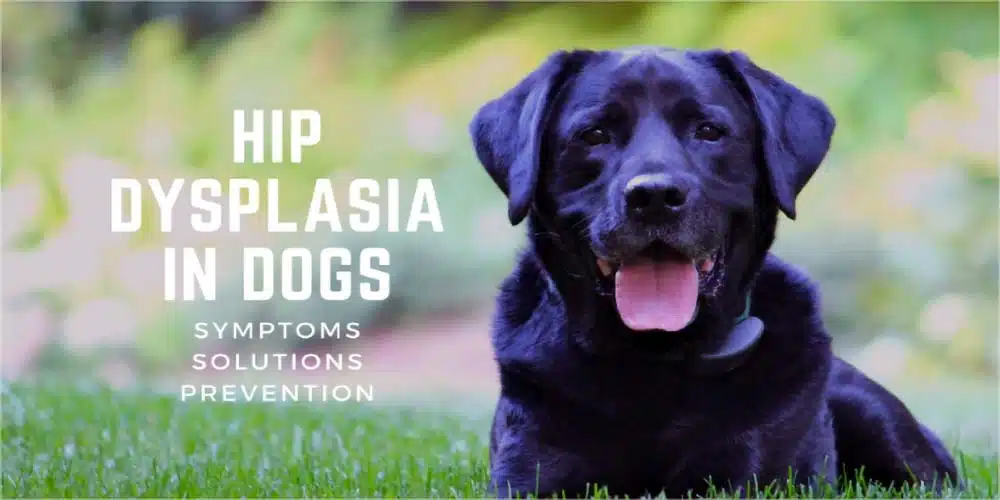


Hip dysplasia. These dreaded words worry many pet owners, but what exactly is hip dysplasia and what can you do about it?
Canine hip dysplasia is a disorder where the hip joint becomes abnormal and deformed during development. Hip dysplasia appears to have a major genetic component as it is common in certain dog breeds. There may also be a nutritional component if growing pups are getting incorrect nutrition or being overfed.
During development, puppies grow rapidly. If the femur bone in the leg does not grow at the same rate as the hip bone, then the “ball and socket” hip joint may become loose and lax. If the ball does not sit well in the socket, then the hip becomes too mobile which can predispose the dog to arthritis.
Hip dysplasia in dogs is a developmental disease so often this abnormality presents in the first 1-2 years of life. In some cases, you will not notice that there is any problem until arthritis in the hips becomes bad later in life. As a result, some cases of hip dysplasia are not discovered until middle to late age.
Certain dog breeds may be more predisposed to hip dysplasia. Many of these breeds are large breeds, but small breed dogs can also be affected by this condition. While hip dysplasia can occur in any dog breed, the following breeds may be at a higher risk:
The most common signs of hip dysplasia in older dogs include limping and stiffness in the back legs. You may also notice that your dog has hip pain. In puppies, you may notice more subtle signs including reluctance to get up or having trouble jumping in the car. If you are curious to learn when you should take your dog to the vet immediately, check out this article on when you should drop everything and take your dog to the veterinary clinic.
The AKC suggests that these are some of the most common signs of hip dysplasia in dogs:
Yes, hip dysplasia is painful especially as your animal ages. Because the joints are excessively lax, arthritis will begin to form in the joint. Arthritis is painful and causes stiff and aching joints. If your dog has been in pain and you suspect they got injured, check out this article on What To Do When Your Dog Is Injured.
Once your dog has been diagnosed with hip dysplasia, there are several treatment options available. There are various surgical options to improve the quality of life in dogs with hip dysplasia, and there are medical treatments that can decrease the pain associated with hip dysplasia.
There is no cure for hip dysplasia in dogs. Once your dog has hip dysplasia, they will have hip dysplasia forever. There are a few surgical options that may help to correct the hips. In younger dogs, the American College of Veterinary Surgeons suggests the Juvenile Pubic Symphysiodesis, the Triple Pelvic Osteotomy (TPO), or a Total Hip Replacement. The other surgical option is a Femoral Head Ostectomy (FHO). In this procedure, the surgeon removes the ball of the femur to reduce pain in the joint.
The dog hip dysplasia surgery cost is variable depending on the procedure performed, but typically, these surgeries are pretty costly. These procedures can cost anywhere from $1000 to $7000 per hip. The total hip replacement is the most expensive of the procedures.
If you are unable to afford surgery or decide that surgery is not the best option for your dog, there are medical therapies that can be used to reduce pain and inflammation associated with hip dysplasia. The most common treatment is a dog-specific non-steroidal anti-inflammatory medication. This type of medication can usually be given every day as needed to help decrease pain. Other medications including gabapentin and Adequan injections can help improve pain associated with hip dysplasia in dogs.
In addition, according to VCA, most dogs with hip dysplasia should receive a glucosamine dog joint supplement and an omega-3 fatty acid nutritional supplement. Physical therapy, maintaining an ideal weight, and regular low impact exercise such as short leash walks can also be beneficial for dogs with hip dysplasia.
Elevate your dog’s mobility and well-being with our top-tier selection of supplements, specifically crafted to support joint health and enhance overall mobility. Our curated picks, enriched with vital ingredients like glucosamine, chondroitin, and omega-3 fatty acids, are designed to reduce stiffness, promote flexibility, and address discomfort, ensuring your dog can move with ease and joy.
While there is no perfect way to prevent hip dysplasia, there are a few things you can do that may reduce your dog’s risk of developing hip dysplasia. It is important to feed growing puppies the correct nutrition. Any large breed puppy should be fed only large breed puppy food, and the amount should be limited to what your veterinarian recommends or the directions on the back of the bag. Puppies who are fed unlimited food may be at higher risk of developing hip dysplasia.
When purchasing a new puppy, be sure to inquire about if the breeder routinely screens for hip dysplasia in their dogs.
If you suspect your dog has hip dysplasia, I recommend contacting your veterinarian so they can assess your dog and take an x-ray. There are many helpful treatments for hip dysplasia that your veterinarian can provide.

The medical, nutritional, or behavioral advice we provide is intended for informational and educational purposes only. Our editorial content is not a substitute for formal or personalized medical advice from a veterinary professional. Only board-certified veterinary specialists who have examined your pet should diagnose medical conditions, provide personalized treatment, or prescribe appropriate medication. For questions regarding your pet’s health, or if your pet is exhibiting signs of illness, injury, or distress, contact your veterinarian immediately. Never disregard professional medical advice or delay in seeking it because of something you have read on our site.